★★
“Can’t spell Ballistic without balls…”
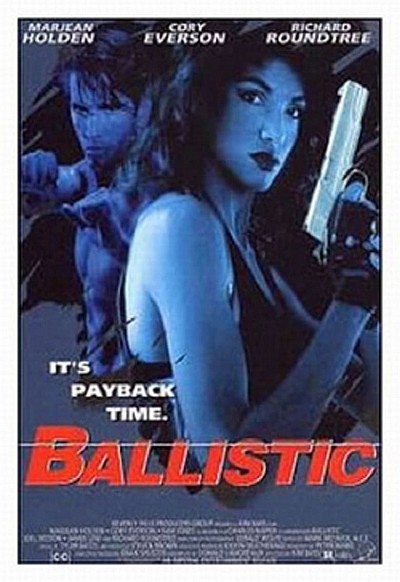 You know you’re in for a slice of stinky, nineties action cheese from the opening sequence. Undercover cop Jesse (Holden) has just taken down a sleazy yuppie drug-dealer, and a homeless woman tells her, “You know what you are, sweetie? You’re ballistic!” We probably need to explain why the film is titled that way, because there’s really not an enormous amount of great action here to justify it. Jesse is your typical, no-nonsense cop, who has just transferred from homicide to the Urban Crime Taskforce, where she is meeting resistance from her new colleagues. She is also trying to help her father (Roundtree), a former cop now doing 20 years after being framed with kilos of coke.
You know you’re in for a slice of stinky, nineties action cheese from the opening sequence. Undercover cop Jesse (Holden) has just taken down a sleazy yuppie drug-dealer, and a homeless woman tells her, “You know what you are, sweetie? You’re ballistic!” We probably need to explain why the film is titled that way, because there’s really not an enormous amount of great action here to justify it. Jesse is your typical, no-nonsense cop, who has just transferred from homicide to the Urban Crime Taskforce, where she is meeting resistance from her new colleagues. She is also trying to help her father (Roundtree), a former cop now doing 20 years after being framed with kilos of coke.
Jesse inevitably makes enemies: she comes under suspicious when a witness is killed on her watch, and is then suspected of the murder of the other cop who was in the safe-house. In reality, it’s all a plot by “respectable businessman” Braden (Jones), who inevitably is a dealer in both drugs and illegal weapons. He runs illegal fights in a warehouse lined with cardboard boxes: his top henchman, the person who killed the cop, is actually a woman, Claudia (the impressive looking body-builder Corinna Everson), and we get a small role from Michael Jai White, who would go on to considerably better things than this. As would the movie’s composer, Tyler Bates, and the cast also includes veteran cult actor Charles Napier as Jesse’s superior.
Despite a relatively good cast, it’s largely dull, often almost painfully so, with the action scenes suffering from a particularly brutal style of editing. Holden comes at at six foot even in height, towering over some of her male co-stars even when not wearing high heels, and does have a degree of film presence. It’s just that Bass, making his directorial debut, does not appear to have any idea of how she should be used. Early on, she’s treated as not much more than a slice of cheesecake, e.g. the opening credits feature Jesse showering in slo-mo, for no reason beyond titillation. The sex scenes with her boyfriend (a character which serves no purpose) are little better, and you could make the case Claudia is actually treated more seriously than the heroine.
The film does at least have the courtesy to give us a fight between the two women, though like much of the rest, the results are far from overwhelming, with them lazily snapping kicks toward each other, at a glacial pace. That’s about the peak as far as Jesse is concerned, with the movie’s climax thereafter largely involving a lot of running round the warehouse by everyone involved. It’s difficult to believe this kind of feature would ever have passed muster, even in the days of straight to video schlock. Though given this was the effective end of Holden’s career as a leading lady, perhaps it didn’t.
Dir: Kim Bass
Star: Marjean Holden, Sam J. Jones, James Lew, Richard Roundtree
a.k.a. Fist of Justice





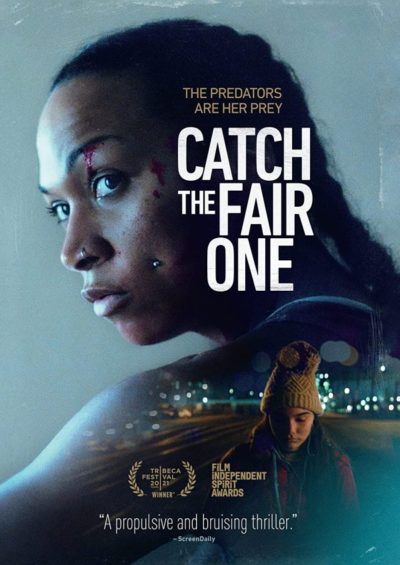 Quite often, in films featuring women who are supposed to be boxers, they simply do not look the part. Safe to say, this is not an issue here. That is apparent from the opening scene, in which Kaylee (Reis) is preparing for a fight. As she warms up with her trainer, the speed and power of her punches is clear, and not cinematic trickery. It’s unsurprising, since Reis is, at time of writing. the current WBA, WBO and IBO light-welterweight world champion. It’s just a shame this movie chooses not to make more use of her undoubted talents in the combat field, and is a tad too earnest to be value as entertainment.
Quite often, in films featuring women who are supposed to be boxers, they simply do not look the part. Safe to say, this is not an issue here. That is apparent from the opening scene, in which Kaylee (Reis) is preparing for a fight. As she warms up with her trainer, the speed and power of her punches is clear, and not cinematic trickery. It’s unsurprising, since Reis is, at time of writing. the current WBA, WBO and IBO light-welterweight world champion. It’s just a shame this movie chooses not to make more use of her undoubted talents in the combat field, and is a tad too earnest to be value as entertainment. Daphne Wool (Varela) has finally had enough of her abusive husband, so has killed him, chopping up the corpse and keeping it in a storage locker. Which actually is a good thing, because it turns out he was wanted by the Mob, and there was a price on his head. For their “help” in carrying out the hit, Daphne and pal Tony Steele (Cappello) are rewarded, but things go further. Daphne becomes a full-time assassin for the gangsters, learning to kill with everything from a paper-clip up, while Tony acts as her facilitator. However, they quickly become a liability to the organization, and are given a “poison pill” contract, being sent to kill weapons inventor Vincent McCabe.
Daphne Wool (Varela) has finally had enough of her abusive husband, so has killed him, chopping up the corpse and keeping it in a storage locker. Which actually is a good thing, because it turns out he was wanted by the Mob, and there was a price on his head. For their “help” in carrying out the hit, Daphne and pal Tony Steele (Cappello) are rewarded, but things go further. Daphne becomes a full-time assassin for the gangsters, learning to kill with everything from a paper-clip up, while Tony acts as her facilitator. However, they quickly become a liability to the organization, and are given a “poison pill” contract, being sent to kill weapons inventor Vincent McCabe.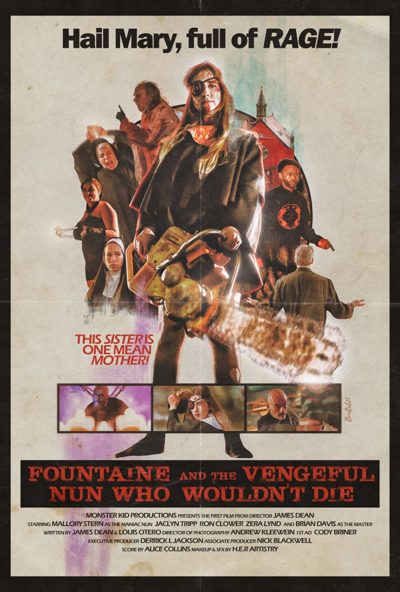 You will probably understand why the title more or less rocketed to the top of my watch-list, especially when accompanied by the poster (right). Naturally, it was almost inevitable that it could not possibly live up to either: the question was mostly, how far short it would fall. The answer is, “a fair bit, yet not irredeemably so,” even if the first half if considerably duller than I wanted. Indeed, it’s also rather confusing, in terms of what’s going on. As well as I can piece things together, Mary (Stern) is a nun who gets sent to an asylum after losing her sister, though it turns out to be less a mental-care facility than you’d expect.
You will probably understand why the title more or less rocketed to the top of my watch-list, especially when accompanied by the poster (right). Naturally, it was almost inevitable that it could not possibly live up to either: the question was mostly, how far short it would fall. The answer is, “a fair bit, yet not irredeemably so,” even if the first half if considerably duller than I wanted. Indeed, it’s also rather confusing, in terms of what’s going on. As well as I can piece things together, Mary (Stern) is a nun who gets sent to an asylum after losing her sister, though it turns out to be less a mental-care facility than you’d expect. I think it’s safe to say you’ll probably be able to decide within a few minutes, whether or not this is your cup of tea. The opening scene is set in a strip-club where the next act on the main stage is dressed as a nun. After a couple of minutes, she pulls out an unfeasibly large weapon from under her clerical garb, and guns down the mobsters present, in gory fashion. Thereafter, you can expect more of the same, along with extremely savage jabs at organized religion. Catholicism is the main target, but Judaism and Hinduism get their share of jabs: for example, Gandhi is a martial arts teacher. Or there’s a Yiddish hitman, Viper Goldstein (Lavallee), who practices the art of “Jew Jitsu”. If you just roll your eyes at that, this is likely not for you. However, if you roll your eyes and also laugh, then you, like me, may be the intended target audience.
I think it’s safe to say you’ll probably be able to decide within a few minutes, whether or not this is your cup of tea. The opening scene is set in a strip-club where the next act on the main stage is dressed as a nun. After a couple of minutes, she pulls out an unfeasibly large weapon from under her clerical garb, and guns down the mobsters present, in gory fashion. Thereafter, you can expect more of the same, along with extremely savage jabs at organized religion. Catholicism is the main target, but Judaism and Hinduism get their share of jabs: for example, Gandhi is a martial arts teacher. Or there’s a Yiddish hitman, Viper Goldstein (Lavallee), who practices the art of “Jew Jitsu”. If you just roll your eyes at that, this is likely not for you. However, if you roll your eyes and also laugh, then you, like me, may be the intended target audience.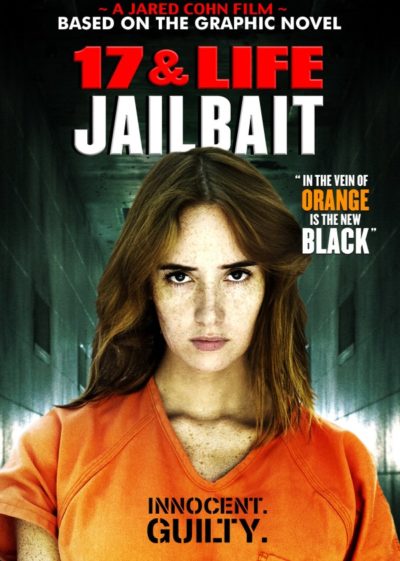 Of all the scathing reviews this has accumulated on Letterboxd.com, I think my favorite is the one which starts, “Obviously written by someone who knows absolutely nothing about the penal system.” Yes, seriously. I strongly suspect things like this were written by people who know absolutely nothing about women-in-prison films, and who inexplicably managed to overlook the title of the damn movie in their expectations. Me, I had initially overlooked this, believing it to be just a retitling of the same director’s
Of all the scathing reviews this has accumulated on Letterboxd.com, I think my favorite is the one which starts, “Obviously written by someone who knows absolutely nothing about the penal system.” Yes, seriously. I strongly suspect things like this were written by people who know absolutely nothing about women-in-prison films, and who inexplicably managed to overlook the title of the damn movie in their expectations. Me, I had initially overlooked this, believing it to be just a retitling of the same director’s  Not to be confused with the 2022 rape-revenge film of the same name (which I’ll get round to reviewing down the pipe), this is somewhat lighter in tone, though there’s a case to be made that this clashes terribly with the subject matter. Jenny (Hsu) is a journalist, working under Cheryl (Garofalo),and her work has brought her to the attention of an online stalker, who sends her increasingly disturbed and disturbing emails. When the harassment begins to move from the cyberworld into the real one, and the authorities fail even to reach the level of disinterest, Jenny teams up with room-mate Lisa (Morales), to hunt down the perpetrator and bring him to justice themselves.
Not to be confused with the 2022 rape-revenge film of the same name (which I’ll get round to reviewing down the pipe), this is somewhat lighter in tone, though there’s a case to be made that this clashes terribly with the subject matter. Jenny (Hsu) is a journalist, working under Cheryl (Garofalo),and her work has brought her to the attention of an online stalker, who sends her increasingly disturbed and disturbing emails. When the harassment begins to move from the cyberworld into the real one, and the authorities fail even to reach the level of disinterest, Jenny teams up with room-mate Lisa (Morales), to hunt down the perpetrator and bring him to justice themselves.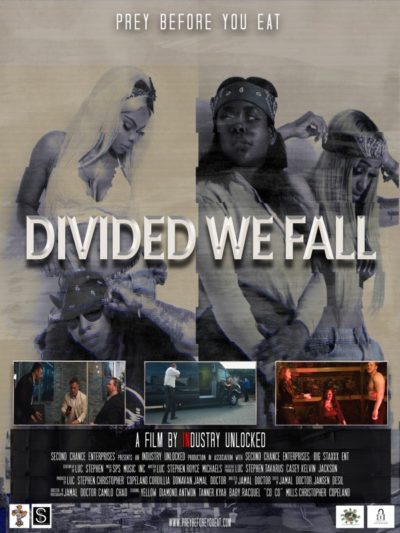 We begin with the usual disclaimer for films of this kind: middle-aged white guys like me are not the target audience. However, I think it’s fair to say that concepts like story-telling and character development are not limited to any particular race, colour or creed, so I still feel equipped to offer an opinion on these aspects. Though, actually, what felt like it worked best here was its strong sense of place. I’ve never been to the projects in Jamaica, New York (though Chris grew up elsewhere in the same borough of Queens). But the film does a good job of showing you that environment; it certainly works better than the (largely token) efforts to convince you some scenes take place in Miami, or even Moscow.
We begin with the usual disclaimer for films of this kind: middle-aged white guys like me are not the target audience. However, I think it’s fair to say that concepts like story-telling and character development are not limited to any particular race, colour or creed, so I still feel equipped to offer an opinion on these aspects. Though, actually, what felt like it worked best here was its strong sense of place. I’ve never been to the projects in Jamaica, New York (though Chris grew up elsewhere in the same borough of Queens). But the film does a good job of showing you that environment; it certainly works better than the (largely token) efforts to convince you some scenes take place in Miami, or even Moscow.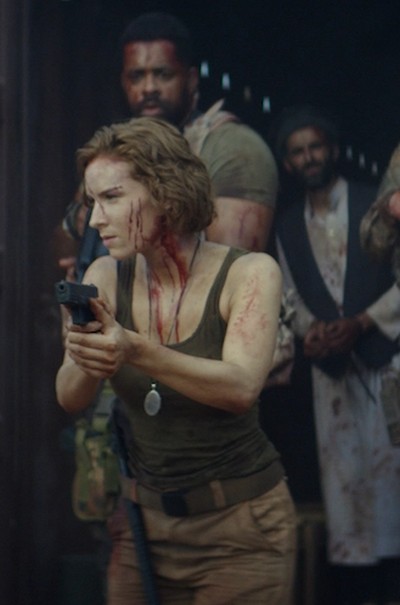 There is a tendency for directors married to actresses to make them action heroines. This perhaps started with Renny Harlin and Geena Davis, but the most famous example is probably Paul W.S. Anderson and Milla Jovovich (she was previously married to Luc Besson too). It seems that Marshall and Kirk may be heading that way, with her starring in his last two movies. First there was witch-pic The Reckoning, and now this, which blends elements from a number of genre films. Not the least of which are Marshall’s own Dog Soldiers and
There is a tendency for directors married to actresses to make them action heroines. This perhaps started with Renny Harlin and Geena Davis, but the most famous example is probably Paul W.S. Anderson and Milla Jovovich (she was previously married to Luc Besson too). It seems that Marshall and Kirk may be heading that way, with her starring in his last two movies. First there was witch-pic The Reckoning, and now this, which blends elements from a number of genre films. Not the least of which are Marshall’s own Dog Soldiers and  The latest stop in our ongoing tour of female-driven urban crime movies brings us to the nation’s capital in Washington, where the police are celebrating just having taken down a leading light in the city’s organized crime industry. Now, they set their sights on a new target: the gang led by Racine Robinson (Vaughan) and her two daughters, Kat (Crosby) and Candy (Bethea). These might prove a tougher nut to crack, since the Robinson crew have a harsh, zero tolerance policy to anyone who messes with them in the slightest, yet also gathered local support during the coronavirus pandemic. Indeed, Racine is so popular in the neighbourhood, a run for political office is not out of the question. However, she has rivals, who have more than a passing interest in seeing her taken out of the picture – albeit for very different reasons, in order to make room for them to rise up.
The latest stop in our ongoing tour of female-driven urban crime movies brings us to the nation’s capital in Washington, where the police are celebrating just having taken down a leading light in the city’s organized crime industry. Now, they set their sights on a new target: the gang led by Racine Robinson (Vaughan) and her two daughters, Kat (Crosby) and Candy (Bethea). These might prove a tougher nut to crack, since the Robinson crew have a harsh, zero tolerance policy to anyone who messes with them in the slightest, yet also gathered local support during the coronavirus pandemic. Indeed, Racine is so popular in the neighbourhood, a run for political office is not out of the question. However, she has rivals, who have more than a passing interest in seeing her taken out of the picture – albeit for very different reasons, in order to make room for them to rise up.